Fri 15 May 2020
A Movie Review by David Vineyard: THE LEAGUE OF FRIGHTENED MEN (1937).
Posted by Steve under Mystery movies , Reviews[8] Comments
REVIEWED BY DAVID VINEYARD:

THE LEAGUE OF FRIGHTENED MEN. Columbia Pictures, 1937. Walter Connolly, Lionel Stander, Eduardo Ciannelli, Irene Hervey. Screenplay by Guy Endore, Eugene Solow, & Edward Chodorov, based on the novel by Rex Stout. Directed by Alfred E. Green.
The bad things to begin with.
And in all honesty they are pretty bad.
Walter Connolly is simply awful as a nice, polite, annoyingly ambulatory Nero Wolfe (he was an even worse Father Brown), who unlike Edward Arnold in Meet Nero Wolfe, doesn’t even look fat enough for the part. He drinks hot cocoa instead of beer, and there is only a passing reference to food. We do passingly hear about orchids and see Wolfe using the phone to call Inspector Cramer from the greenhouse, and he punishes Cramer for “disrespecting the orchids,†but that and a bit of high-handed business from the book is about it far any glimpse of the real Wolfe goes save for one scene at the end.
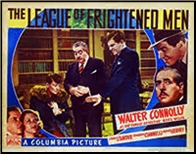
He’s not even rude and he doesn’t say ‘pfui’ once.
This one even celebrates solving the case by taking Archie out for a drink.
He does live in a fairly decent recreation of the brownstone, though.
Fritz and Theodore don’t appear, instead Wolfe has a reformed crook named Butch as his butler, and if Sol and the boys don’t exactly show up, Archie has two “guys†he relies on.
And again there is Lionel Stander as Archie Goodwin, so thick we cannot believe Wolfe would employee him much less rely on him. We open with Archie bored and goading Wolfe to go to a movie with him. No, not teasing Wolfe, not deliberately tweaking his eccentric boss, no, admiringly wondering why Wolfe won’t go to a movie with him.
Archie is embarrassingly admiring of Wolfe throughout.
That said, Stander this time gets to do some decent leg work, and if he is a low rent thug and not so comic relief, he still follows Stout’s plot enough to do some decent detective work, though considering how casually Wolfe moves in and out of the brownstone it is hard to imagine why he even needs Archie.
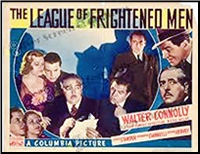
Maybe he secretly wants to go see that murder mystery with him.
He still comes off better than Cramer. Archie doesn’t fall through a door on his face eavesdropping.
As in the book, Wolfe is approached by a member of a group of Harvard graduates who once took part in a hazing that crippled writer Paul Chapin. Now two of their members are dead, and they suspect Chapin is killing them off. Wolfe, in one thing at least like the real Wolfe, turns down the first millionaire in order to get all the “league of frightened men†to pay him.
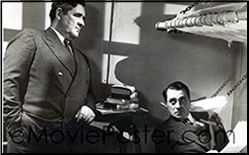
And who should walk in on his two canes appearing threatening and sinister as Wolfe is making his selling point than Paul Chapin (Eduardo Cianelli, who is excellent as the bitter wounded man despite an accent no one really explains)?
There is another murder, and Chapin is caught red-handed, proving to Wolfe he can’t possibly be guilty.
The film does not depart too much from the book in most things. It even ends with a gathering of the suspects, and Wolfe, typically highhanded, catching the killer out, as usual in a way that would be absolutely useless in a courtroom if the killer just bluffed Cramer and called a lawyer.
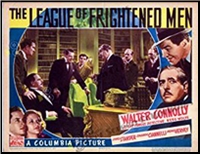
I give Stout those scenes, I’ll give them to the movie.
As in the book, the best scene may be the final meeting of Wolfe and the ungrateful Chapin. Wolfe’s appreciation of the wounded proud man is the closest we get to seeing the real Nero.
As far as the mystery and plot, this one works better than the Arnold outing, and at least Connolly isn’t as annoyingly jolly as the chuckling Arnold (why is it so many actors play Wolfe as so much nicer and happier than Stout wrote him? William Conrad’s smiling was the worst part of his Wolfe).
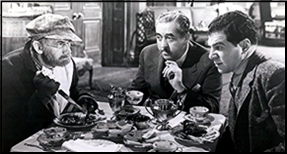
The good things: there is some atmospheric camera work, a generally good cast of suspects, all well versed in playing the main bad guy, a fairly literate script despite the portraits of Wolfe and Archie, and above all else Eduardo Ciannelli.
But how anyone read those two books and ended up with Walter Connally and Lionel Stander as Nero Wolfe and Archie Goodwin…
That’s a mystery even Wolfe’s father couldn’t solve.
At least Eugene Pallette would have been fat and irritable enough, though I can’t quite wrap my head around William Powell as Archie or for that matter Errol Flynn.
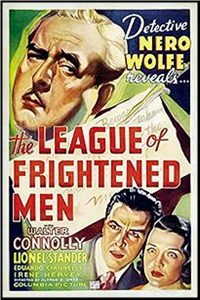
May 15th, 2020 at 5:50 pm
I’ve not yet seen this, but it sounds as bad as I expected in many ways, but better in others.
May 15th, 2020 at 6:47 pm
It was better than I expected, though not as a Nero Wolfe film, and mostly because of Ciannelli and the script that tried to follow the book a bit. MEET NERO WOLFE wasn’t half as good an adaptation of FER DE LANCE, and neither Wolfe nor Archie came half as close to the original in behavior in that one.
May 16th, 2020 at 8:38 am
Columbia seems to have indulged in series detective movies more than any of the other major studios, including Boston Blackie, the Lone Wolf, Crime Doctor, and Thatcher Colt. Though all of them had their moments, none were particularly distunguished.
May 16th, 2020 at 9:15 am
Of all of the above, I’d say the Boston Blackie movies were the best. The other no more than routine.
May 16th, 2020 at 6:05 pm
Columbia had the same problem with serials, they would spend the money to acquire material like Superman and Batman and then Harry Cohn would try to get by on a shoestring and sabotage the whole thing while Republic on an actual shoestring used imagination and talent to make up for their shortcomings.
They were so notorious that Clark Gable threatened to quit when they loaned him out from MGM for IT HAPPENED ONE NIGHT.
They threw away Ellery Queen too, another series they spent money on then tried to cheap their way through.
They weren’t poverty row, but they were at the end of the block where poverty row started until Cohn, as Red Skelton noted, “gave the people what they wanted,” and died.
As for the Boston Blackie series I give full credit to Chester Morris who fought for better scripts and put a lot of himself into the films (Blackie became an amateur magician because Morris was). Without Morris Blackie was just a vague concept from some good magazine stories.
His commitment to the series is the real difference. There really was no Boston Blackie before Morris, the original handful of stories by Boyle that were too grim for a film series and a few silent films at least one of which was more about the co star dog than Blackie. Everything most of us know about Blackie is Chester Morris and not Boyle. Even the radio and television series is a continuation of Morris version.
They did do fairly well with the Thatcher Colt films, but there were only two of them with Adolph Menjou and they didn’t catch on.
Oddly money isn’t the problem with the Nero Wolfe films or with the later Conrad series. The problem was buying material and then changing the nature of established characters to fit what they thought audiences wanted. They kept writing Wolfe as irritable but soft hearted instead of stubborn, acerbic, petulant, and arrogant but high minded and with his own ethics as Stout wrote him and Maury Chaykin eventually played him.
May 22nd, 2020 at 7:15 pm
Not that it really matters, after all these years …
… the boss of Columbia Pictures was Harry COHN – no E.
Pronounced like the ice cream treat.
May 22nd, 2020 at 9:32 pm
Will fix that ASAP, Mike. I like to think this is a blog that does it right, no matter how how old the material covered is. Thanks!
February 13th, 2023 at 9:56 pm
[…] Vineyard admirably analyzed the strengths and, more pointedly, weaknesses of the onscreen League here in a 2020 review so I will, with some relief, turn back to Wolfe’s literary and cinematic […]